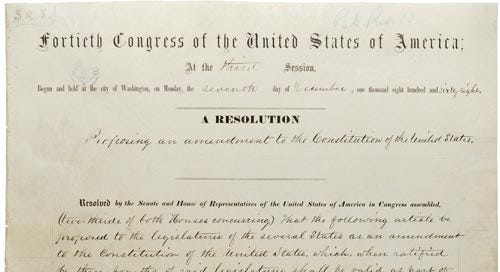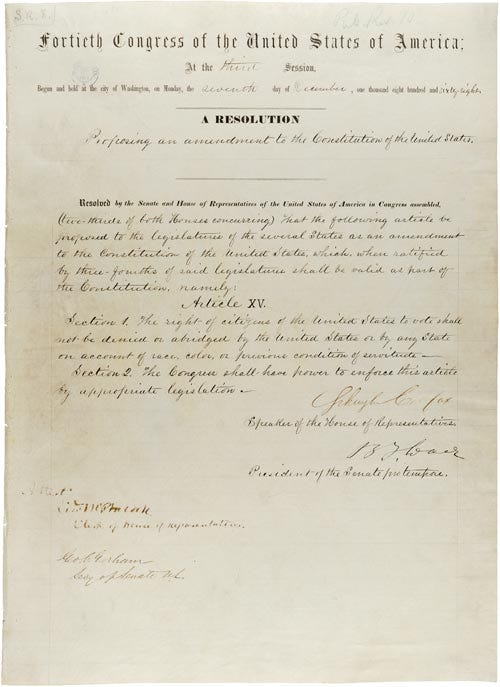Issue #505 Today In Black History, Monday, February 19, 2024
Today’s Black History WOW!
The 15th Amendment to the United States Constitution was ratified on February 3, 1870. This amendment granted African American men the right to vote, stating that the right to vote could not be denied based on race, color, or previous condition of servitude. Of course, women of any race could not vote until the passage of the 19th Amendment in 1920.
The ratification process required at least three-fourths of the states to approve the amendment, and it was finally ratified on February 3, 1870, when the state of Iowa became the 28th state to do so.
Despite the passage of the 15th Amendment, African Americans still faced significant barriers to voting, including poll taxes, literacy tests, grandfather clauses, and violence and intimidation tactics. It wasn't until the Voting Rights Act of 1965 that many of these discriminatory practices were officially outlawed.
The Voting Rights Act of 1965 was a landmark piece of legislation that aimed to end racial discrimination in voting practices. It prohibited literacy tests, poll taxes, and other discriminatory measures that had been used to disenfranchise African American voters. Additionally, it required certain states with a history of voter suppression to obtain federal approval before making any changes to their voting laws or procedures.
However, in recent years, there have been efforts to roll back voting rights protections. In 2013, the Supreme Court decision in Shelby County v. Holder struck down a key provision of the Voting Rights Act that required certain states to obtain federal approval before changing their voting laws. This decision has led to a resurgence of voter suppression tactics, such as strict voter ID laws, voter roll purges, and reductions in polling places in minority communities.
The 1870 15th Amendment and the 1965 Voting Rights Act are federal laws meant to ensure that the states that are in charge of conducting the federal elections upheld voting rights. However, more and more states have been empowered by right-wing state legislators and the conservative members of the U.S. Supreme Court to conduct ongoing challenges to voting rights, such as gerrymandering and efforts to suppress early voting and absentee voting. These efforts disproportionately impact minority communities and inhibit their ability to participate in the democratic process.
In response to these threats to voting rights, advocates and lawmakers have pushed for legislation to restore and strengthen the Voting Rights Act. Efforts to pass the John Lewis Voting Rights Advancement Act, named after the late civil rights icon, seek to modernize and reinforce the protections of the original Voting Rights Act.
Until and unless the Democrats re-elect President Joe Biden and Vice President Kamala Harris, regain the House majority, increase the Senate majority, and expand and rebalance the Supreme Court members, voting rights will continue to be eroded.
Today In Black History
- In 1919, the first meeting of the Pan-African Congress, organized by W.E.B. DuBois, was held in Paris, with 57 delegates: 16 from the United States and 14 from various African countries and colonies. Blaise Diane of Senegal was named president and W.E.B. DuBois was named secretary.
- In 1959, the African nation of Gabon adopted its constitution.
- In 2002, Vonetta Flowers became the first African-American woman to win a gold medal at the Winter Olympic Games when she and her partner Jill Bracken won the inaugural women’s two-person bobsled event.
- In 2019, New York City banned hair discrimination, intending to limit racial stereotyping.
The “Comments” feature has been disabled. Instead, let’s discuss these facts in our community on Substack Notes. You can also read other Substack publications without subscribing to them when you join Notes.
This post is free to read/listen to for three days after publication. To have 365 24/7 access to all our posts and podcast episodes and financially support “We Are Speaking” for no more than $5 per month, please subscribe at the paid level. You will receive a 7-day FREE trial!






